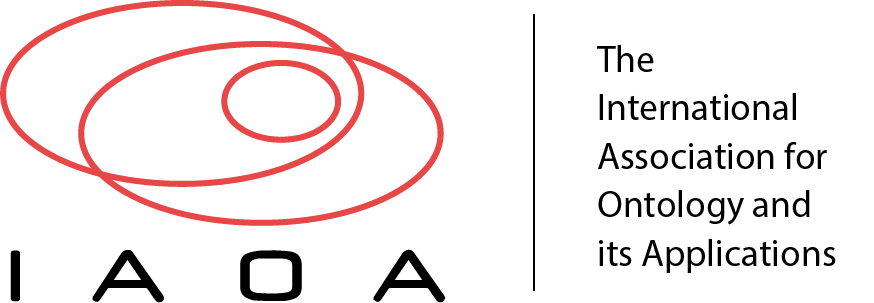FOIS 2020 – CALL FOR PAPERS
September 14-17, 2020, Bozen-Bolzano, Italy
https://fois2020.inf.unibz.it/___ New submission deadline: 15 April (strict deadline) ___
———————————–
———————————–
Nicola Guarino, ISTC-CNR, Trento
Stefan Schulz, Medical University of Graz———————————–
———————————–
The advent of complex information systems that rely on robust, coherent and formal representations of their subject matter, has led to the exploitation of ontological analysis and ontology-based representation. The systematic study of such analysis and representation is at the center of the modern discipline of formal ontology, which is a general theory of the types of entities and relations making up domains of interest.Researchers in many domains engage with formal ontology to provide a solid foundation for their work. Common application areas include conceptual modeling, database design, knowledge engineering and management, software engineering, organizational modeling, artificial intelligence, robotics, computational linguistics, the life sciences, bioinformatics and scientific research in general, geographic information science, information retrieval, library and information science, and the Semantic Web.
The FOIS conference is a meeting point for all researchers with an interest in formal ontology. The conference encourages new high quality submissions on both theoretical issues and concrete applications. As in previous years, FOIS 2020 aims to be a nexus of interdisciplinary research and communication.
FOIS is the flagship conference of the International Association for Ontology and its Applications (IAOA: http://iaoa.org/), which is a non-profit organization promoting interdisciplinary research and international collaboration in formal ontology.
FORMAT
——————————
FOIS 2020 includes a number of activities:
* FOIS conference (single track program)
* workshops (in conjunction with EKAW 2020 and ICBO 2020)
* tutorials (in conjunction with EKAW 2020 and ICBO 2020)
* a young researchers symposium
* a demo and industry track
* an ontology show and tell—————————–
IMPORTANT DATES – UPDATED
—————————–
* Paper Submission Deadline: 15 April 2020 (strict deadline)
* Notification: 22 June 2020
* Camera-ready Papers: 10 July 2020
* Conference Dates: 14-17 September 2020
More information on: https://fois2020.inf.unibz.it/
SUBMISSIONS
——————————
FOIS seeks full-length high-quality papers on a wide range of topics. An ideal FOIS paper will address both content-related ontological issues, their formal representation, as well as their impact and relevance for some aspect of information systems. Please refer to the FOIS submissions page for submission details (https://fois2020.inf.unibz.it/call-for-papers/). As usual, the FOIS proceedings will be published by IOS Press.
Related activities, such as workshops and tutorials, may specify different submission formats, for example, short papers or posters. Please refer to the relevant related activity page for submission and publication details.
See also: https://www.iaoa.org/jowo/2020/
TOPICS OF INTEREST
——————————
Areas of particular interest to FOIS include the following:
Foundational Issues
* Kinds of entities: particulars/universals, continuants/occurrents, abstracta/concreta, dependent entities/independent entities, natural objects/artifacts
* Formal relations: parthood, identity, connection, dependence, constitution, causality, subsumption, instantiation
* Vagueness and granularity
* Space, time, and changeMethodological issues
* Top-level vs. domain-specific ontologies
* Role of reference ontologies
* Ontology similarity, integration and alignment
* Ontology modularity, contextuality, and evolution
* Formal comparison among ontologies
* Relationship with cognition, language, semantics, context
* Ontologies and Knowledge Graphs
Domain-specific ontologies
* Ontology of physical reality (matter, space, time, motion etc.)
* Ontology of biological reality (organisms, genes, proteins, cells etc.)
* Ontology of mental reality and agency (beliefs, intentions, emotions, perceptions, cognition, etc.)
* Ontology of artifacts, functions, capacities and roles
* Ontology of social reality (institutions, organizations, norms, social relationships, artistic expressions etc.)
Applications
* Ontology-driven information systems design
* Ontological foundations for conceptual modeling
* Knowledge management
* Qualitative modeling
* Computational linguistics
* Information retrieval
* Semantic Web
* Business modeling
* Ontologies and Machine Learning
* Ontologies and Explainable AI
* Ontologies for particular scientific disciplines (biology, chemistry, geography, physics, geoscience, cognitive sciences, linguistics etc.)
* Ontologies for engineering: shape, form and function, artifacts, manufacturing, design, architecture etc.
* Ontologies for the humanities: arts, cultural studies, history, literature, philosophy, etc.
* Ontologies for the social sciences: economics, law, political science, anthropology, archeology, etc.
——————————————–
CONFERENCE ORGANISATION
——————————————–
General Chair
* Roberta Ferrario (ISTC CNR, Trento, Italy)
Program Chairs
* Boyan Brodaric (Geological Survey of Canada, Canada)
* Fabian Neuhaus (Otto von Guericke University Magdeburg, Germany)
Local Organization
* Oliver Kutz (Free University of Bozen-Bolzano, Italy)
* Nicolas Troquard (Free University of Bozen-Bolzano, Italy)
Publicity Chairs
* Guendalina Righetti (Free University of Bozen-Bolzano, Italy)
* Maria Hedblom (Free University of Bozen-Bolzano, Italy)
Proceedings Chair
* Megan Katsumi (University of Toronto)
Workshop / Tutorial Chairs
* Torsten Hahmann (University of Maine)
* Claudio Masolo (ISTC CNR, Trento, Italy)
Ontology Show and Tell
* Michael Gruninger (University of Toronto)
* Frank Loebe (University of Leipzig)
Early Career Symposium
* Pawel Garbacz (John Paul II Catholic University of Lublin)
* Selja Seppala (University College Cork)
Demo and Industrial Track Chairs
* Robert Hoehndorf (King Abdullah University of Science and Technology)
* Amanda Vizedom (Credit Suisse)
